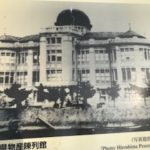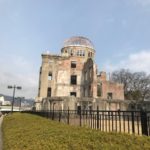Have you ever been caught in a rare moment when it feels like your child is growing up in that very second, right before your eyes…and not wanting it to happen? I had one while visiting the Atomic Bomb Dome and Peace Memorial Park in Hiroshima, Japan.

At 815 am on 7 August 1945, the atomic bomb exploded in the air over this site, scorching a city-wide two-kilometre radius and killing over 100,000 people in a flash.

From across the memorial’s museum atrium, I watched my fourteen-year-old son drift slowly past melted children’s toys, images of charred bodies, and a wall-sized mural of a classroom of smiling school kids; alive one day, extinguished the next. He was reading every plaque, his expression gripped in a battle of sorrow, anguish and confusion. Desmond Tutu described his own visit here as one of utter devastation.
All through his childhood, I had tried my best to shield my son from such horrors, to keep him away from the knowledge of the unspeakable things humans could do to each other. Watching him, I fought an overwhelming urge to rush over, press his face into my breastplate and whisper ‘Don’t look, don’t see, don’t grow up…not yet, please not yet.’ But it wasn’t my choice. Through the steely glaze in his blue eyes, I could almost hear a piece of his innocent soul sheering off, replaced by something harder, tougher, a dreadful knowledge – once learnt – never forgotten.
They called it ‘little boy’, that bomb, as though it carried some link to innocence. In a nearby recorded interview, an old Japanese woman described the August morning decades ago when that little boy arrived in Hiroshima. ‘All went bright,’ she said, ‘like a flash.’ She described how the darkness of night followed, then as the light returned, she climbed ash-covered to her feet to find her neighbourhood smouldering. Rushing to the flattened rubble of her home, she found her small son lying still in his bed, peaceful, dead – the memory of the round pyjama buttons melted into his torso staying with her forever. Her daughter also lay dead nearby. Her husband survived but his hair started falling out. After laying down that night, he never got up again. In one of the great understatements, the old lady wiped tears away and said, ‘that bomb messed with my life.’
I left the museum with my wife, son and daughter, carrying a scorching ache of what it might feel like to see my own family obliterated. This is what travel does; being there, it touches me in a way no book, movie or documentary can ever do. Outside the museum, a flame burns on, designed to flicker until the world is disarmed from nuclear weapons. Unlikely, I will ever see it doused. Yet now, I hear world leaders boasting about the size of their nuclear red buttons, like jocks bragging of conquests in locker room talk. Threatening to rain hell and fury down on populations the likes of which the world has never seen, I wonder if they have ever left their golden towers to truly grasp what their bluster, if ever enacted, would produce – how many lives it would mess with.
On the bullet train back to Kyoto, I ask my son what he thought of the memorial. Stammering for a response, he eventually produced ‘thought-provoking.’ Taking advantage of this rare father son moment, I delved further, asking for his opinion of the A to B to C line of logic that led President Truman to decide that dropping the bomb on a civilian population was the best solution.
Glaring at me as though it was an act of madness to even give air-space to this question, he snapped, ‘There is nothing that could ever lead to that decision, not ever…ever.’
It’s an unusual world where the nuclear codes might be safer in the hands of teenagers than some of the leaders. I may not have wanted my son to learn of these things at such an age, but hoped he would be a better, more resilient person for it. If he ever found himself in a position of influence, maybe he would re-tell of this visit to Hiroshima, and the world would be a better place too.
Our conversation ended; personal processing began. Gazing out the window of the Shinkansen at the snow-tipped mountains flashing past, I smiled with sad acceptance that my son was now also slashing forward on his own path, knowing that I couldn’t hold his face to my chest any longer.